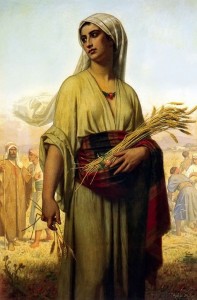 I was recently reading the book of Ruth and was struck by the insight it offers into our vocation as followers of Jesus today. There is something sacred about an ancient narrative informing our modern narrative in ways that impact the way we live, love and lead. I will highlight three themes in Ruth that paralleled the life of Jesus and the story he has called his people to live out and into.
I was recently reading the book of Ruth and was struck by the insight it offers into our vocation as followers of Jesus today. There is something sacred about an ancient narrative informing our modern narrative in ways that impact the way we live, love and lead. I will highlight three themes in Ruth that paralleled the life of Jesus and the story he has called his people to live out and into.
The first theme is that of identity as is found in bloodline versus voluntary submission. In versus 16 & 17 of chapter 1, Ruth gives up her identity as was found in her familial bloodline and exchanges it for a new familial identity in Naomi and the people of Israel. Ruth embraces her new identity as her true identity and it is her faithfulness in that that has direct implications for the advance of God’s Story in Israel (see genealogy of David in 4:18-22). In the same way that Ruth submitted herself to a new family and identity in Israel, followers of Jesus are to submit their identity found in family of origin to their identity as part of the Kingdom family. Mark 3:31-35 tells of Jesus radical redefinition of family in light of Kingdom he inaugurated. For followers of Jesus, identity can no longer be primarily found in bloodline, but in a voluntary submission to the Kingdom Family shaped around Jesus.
The second theme can be found in Ruth freely choosing the way of self-sacrifice and obedience for the sake of her family and neighbors. Throughout the narrative, Ruth is consistently making decisions that are intended to support, encourage and advance the good of Naomi and her family line over her personal good. From voluntarily remaining with Naomi when it wasn’t required of her (1:16/17), to heeding Naomi’s request for her to pursue a relationship with Boaz (3:2-4) to giving birth to a son that would carry on the family line (4:13), Ruth consistently put the good of others ahead of herself. Similarly, Jesus calls his followers to embrace the cruciform life and freely choose to live in Christ for the sake of others. Jesus argues that our primary vocation is to love God and to love others (Matt. 22:37-39). In Mark 1, Jesus comes announcing the arrival of a new Kingdom that we later find out is marked by service of and selfless sacrifice to the point of death on a cross.
The final theme is that of Ruth’s faithfulness, which leads to the redemption of a whole family line. It is important to note that Ruth’s individual actions don’t just impact her immediate surroundings, but influence the good of her adopted family and the people of Israel (4:13-17). In other words, there is redemption and restoration of many that comes as a direct result of her faithfulness. Similarly, it is our faithfulness to an identity and vocation rooted in Jesus that will be the means through which a watching world is invited into the redemption Story of God. Jesus not only acted decisively as the redeemer of Israel and all the cosmos, but he extents this vocation to his followers in John 20:21 when he says, “As the Father has sent me, so I send you!” Like Ruth, the way we live, love and lead has direct implications for the redemption and restoration of those around us. God has chosen to tell his Story and advance his restoration project through his people.